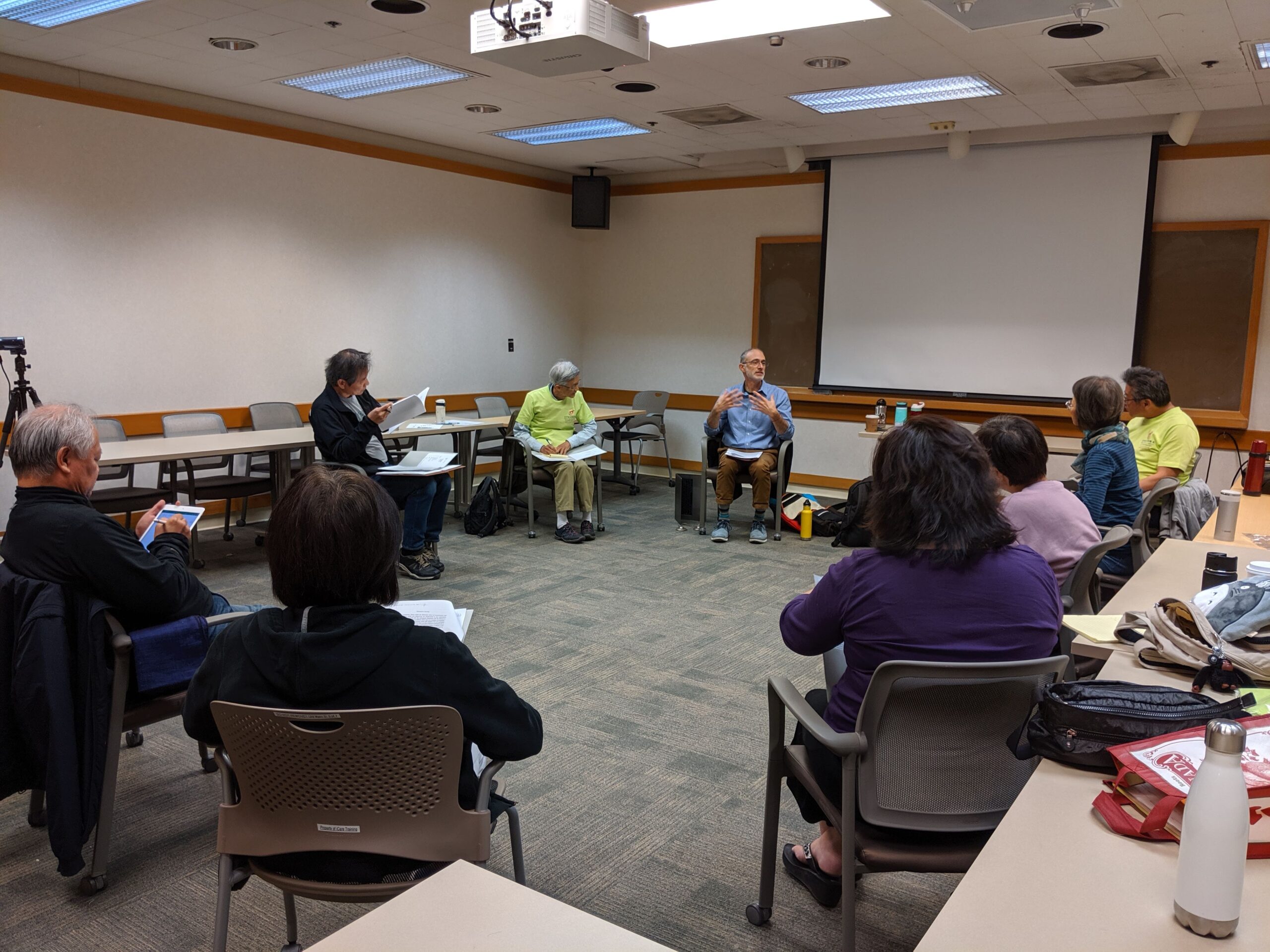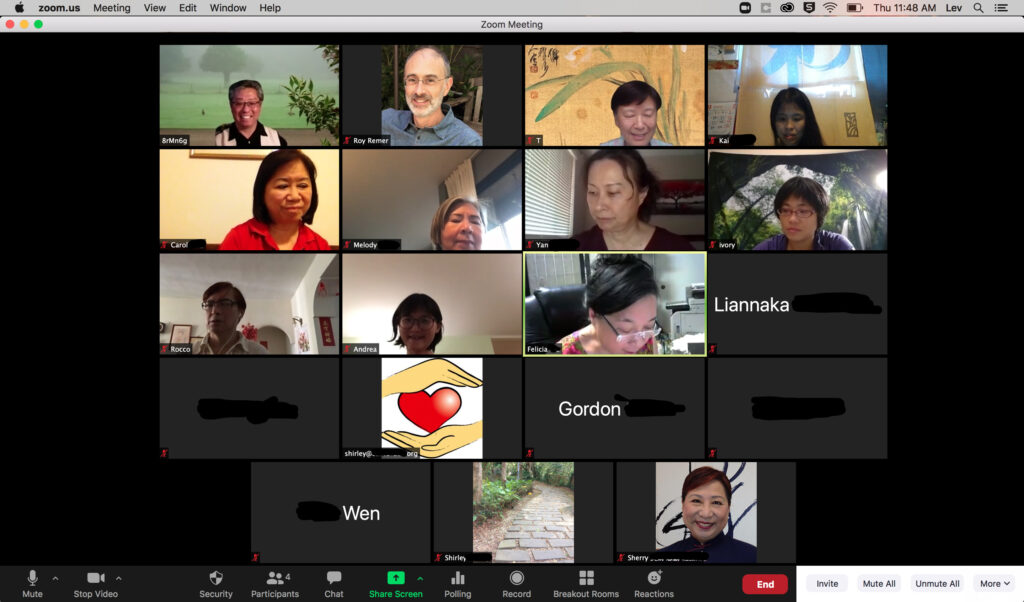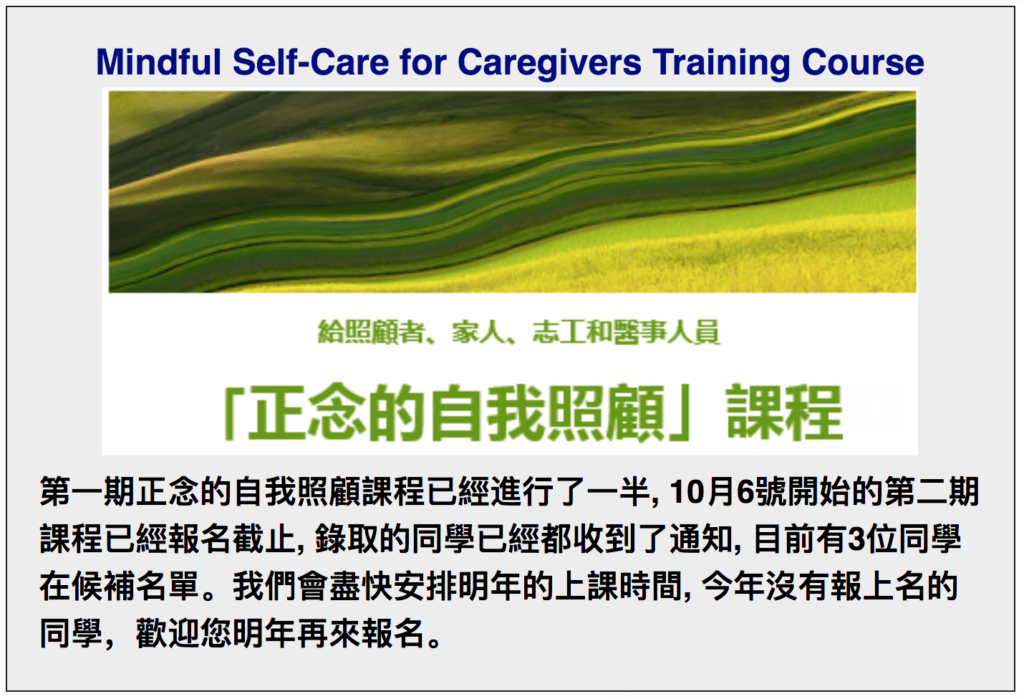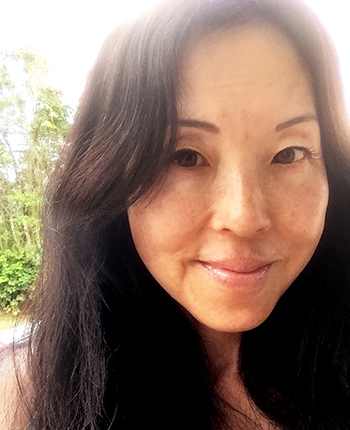Uncategorized
How Zen Caregiving Project sessions have helped me in my work
Zen Caregiving Project has been running free online sessions to support our wider community throughout the pandemic. In these sessions, we’ve shared our mindfulness-based approach to managing difficult emotions, coping with loss, cultivating compassion, and accepting things as they are. These sessions have touched people in different ways. Joan attended 10 sessions and below she shares how the sessions have helped her.
Joan’s story
I am a Licensed Professional Counselor (LPC) and have worked for Hospice of Wichita Falls in Texas for the past eight years, with the last three years being in the Bereavement Department. My role involves working with people who have lost a loved one, and helping them process and work with their grief.
In such emotionally charged work, I know that I am susceptible to compassion fatigue. Being able to support others when they are suffering is an honor but it can also be emotionally tiring. I know that there is a very fine line between compassion fatigue and burnout, and I often walk that line.
ZCPs sessions have helped me recognize the importance of practicing regular self-care, and that it is necessary for me to look after myself in order to take care of my patients, my family and my colleagues. As a counsellor I do know that self-care is important but I don’t have a lot of people advocating and affirming that it is necessary for me to do on a regular basis. And with my busy job, with lots of multitasking: sending emails, phone-calls, counseling clients and families, it’s easy to say to myself “I’ll do one more thing, just one more, and one more” and never stop. The sessions from ZCP have taught me about the benefits of even little moments of mindfulness, stopping in the middle of the business of the day and saying “OK Joan, sit back and take three deep breaths”. Or practicing a one minute meditation with my hand on my heart.
And if there are evenings that I finish work and I am still really wound up or have “monkey mind” (as Roy refers to it), that’s when I will go and re-watch a recording of one of the sessions, which are posted on the ZCP website, and I feel more grounded and calm.
What I’ve learned in the sessions I’m using at work too. I am slowly introducing mindfulness techniques to a weekly grief group I run on zoom. Many of the people that attend the group are widows who have been “doing, doing, doing” all their lives so it is not in their nature to slow down and take time for themselves. But when they do, when they breathe and have the space to listen to their heart, the tears come, and I am there to let them know that it is OK, and that crying is natural and healthy.
I had known some of these mindfulness techniques from doing mindfulness years ago, but if you don’t have someone reminding you about them regularly you forget them. Having these sessions has helped me remember ways to share mindfulness as well as learn new techniques and practices.
I am deeply grateful for the ZCP sessions and appreciate the team so much. I feel a strong sense of community with ZCP and those that attend the session and feel so supported by what ZCP offers. The way I look at it, ZCP supports me so that I can continue my work supporting and helping others. What a nice way to share and support each other as a community.
How we’re reaching Chinese-speaking family caregivers
This August marked almost a year since we partnered with the Chinese-American Coalition for Compassionate Care (CACCC) to translate our Mindful Family Caregiving course into Chinese. In that year we’ve trained volunteers, translated the course and CACCC have launched the first “Mindful Self-Care for Caregivers” in Chinese. Phew! Below we share more about the process and the outcomes and what’s next.
The need for translation
According to the most recent census data, 21% of the US population speak a language other than English at home. Of these, 12% (7.3 million people) don’t speak English well, or don’t speak it at all. This data, coupled with our own experience supporting caregivers in a linguistically diverse area, made it clear that we needed to start offering our family caregiving support in languages other than English.
In August 2019 we partnered with CACCC to translate our Mindful Family Caregiving course into Chinese and to train Chinese-speaking volunteers to deliver the course. With over 1 million Chinese speakers in California alone, over half of whom feel they speak English “less than well”, we knew this project would be meeting a real need.
The process
The translation process had three main stages.
Stage 1: All volunteers took our Mindful Family Caregiving (in-person) allowing the team to see what elements of the course translated well to Chinese, and which didn’t. (See our original blog to read more about that.)

Stage 2: The team selected which modules to bring into the new Chinese course, and all materials were translated, including lesson plans, support documents and handouts.
Stage 3: Volunteers received more training on Mindful Family Caregiving content and teaching skills which, thanks to COVID-19, was all conducted online via zoom.

Finally, the teaching!
In August 2020, Mindful Self-Care for Caregivers Training was launched. It is an online, 8-week course in Chinese, taught via zoom.

The class reached its max capacity at 12 students, with another course being run in October 2020. Results from the first cohort show that 100% rated the course excellent or very good, and everyone agreed the course would help them use mindfulness in their caregiving, be a better caregiver and feel a greater sense of wellbeing.
During these first courses, the Zen Caregiving Project instructors have been observing the teaching and providing feedback to the volunteers, helping them deliver the highest quality experience and support for course participants.
Looking to 2021 and beyond
Mindful Self-Care for Caregivers is scheduled to run every quarter next year, reaching 50 family caregivers in need. If you are interested in having the course run at your organization, please contact CACCC at info@caccc-usa.org.
Having designed and worked through the translation process with CACCC Zen Caregiving Project would love to work with other partners, particularly Spanish-speaking organizations who would be interested in partnering with us. To find out more, please get in touch by clicking the button below.
Staying close from afar: Palliative care volunteering during the pandemic
by Bethany Becker
Every week for almost a year, I visited Laguna Honda Hospital on Wednesday evenings to serve as a volunteer caregiver through Zen Caregiving Project (ZCP). These five hours were among my most cherished of the week, giving me time to connect deeply with residents of the palliative care ward, fellow volunteers and staff while disconnecting from daily distractions. Our sessions always began with a meditation and check-in with our fellow volunteers, where we’d center ourselves and share our feelings and experiences that day. After that, we had several hours of open-ended time to spend how we chose on the ward. Some days, that meant listening to someone’s life story or helping the staff with various tasks; others days, it meant sitting beside someone who was close to dying or providing support to visiting family members.
Once the pandemic hit, Laguna Honda closed their doors to outside visitors in order to protect residents and staff. My Wednesday night ritual was replaced with a growing uncertainty about when we might be able to return. Of all the losses I felt at the start of shelter-in-place, this one hit the deepest. How do you replace physical touch or silent presence from afar?
The community of ZCP volunteers began meeting over Zoom each week to help us stay grounded and process these changes. Week after week, familiar and new faces lifted each other up and vulnerably shared their fears. After a few months, with help from Laguna Honda staff, ZCP set up a remote volunteering program through which volunteers could video call with residents via iPads. This new type of interaction has offered new experiences, both challenging and enriching.
While I’ve lost the ability to do so many things–sit quietly with someone who is actively dying, offer comfort through physical touch, connect with non-verbal residents, have spontaneous encounters with new residents or nurses–I’ve also gained experiences I would not have otherwise. Because of my work schedule, I used to visit in the evenings, when many residents were already asleep. Participating in the video chat program during the day, I am able to interact with residents that I would not have been able to speak to in-person during an evening visit.
For the past few months, I’ve had regular virtual visits with three residents. I have been pleasantly surprised by my growing connection with Edna*, a resident with progressive dementia. She may not know me by name, but we have delightful conversations. Edna has a remarkable quality of speaking like a poet, and she always drops incredible tidbits of rhyming wisdom. We end every conversation with “I love you” and well wishes for each other’s families.
I’ve also reconnected with Martha*, who I sometimes had dinner with during my in-person visits. Martha’s initial skepticism over video chats turned to joy and wonder in our first session. She couldn’t get over how much it felt like I was in the room with her. Because of her short-term memory loss, I’ve been able to witness this excitement over virtual connection many times over.
I’m not sure when I will be able to return to Laguna Honda in person. The nature of this work is to embrace change, let go of expectations and accept what is. I try not to dwell on what’s to come next. Today, I choose to answer a call and get transported to Edna’s universe. For 20 minutes, we are not living through a pandemic or talking through an iPad, we are just two people, laughing our way through Thursday.
*Names changed for resident privacy
Partnering with Zuckerberg San Francisco General Hospital to support to family caregivers
The problem
When hospital clinicians have consultations with their terminally ill patients, the patient is often accompanied by a family member or friend. In many cases, this family member or friend is also providing some kind of care for the patient – driving them to appointments, picking up groceries, helping with medication, doing cooking etc. These family and friends are in the role of family caregiver.
We know from research and our own work that family caregiving can bring purpose and connection, but can also bring challenge and stress, with caregivers that feel burdened being at higher risk of depression and burnout, which in turn impact their ability to provide care.
Hospitals want to support the family caregivers they are in contact with, but funding this support is challenging with health-insurance being tied to treatment for the patient and not support for caregivers. In facilities like Zuckerberg San Francisco General Hospital (ZSGH), whose patients are primarily from underserved backgrounds with no private healthcare insurance, there are few funds to hire in external organizations to provide support to caregivers on an ongoing basis.
To solve this problem Zen Caregiving Project (ZCP) and ZSFG received funding from the Stupski Foundation to create a sustainable Train-the-Trainer program in which hospital staff are trained to deliver support sessions to family caregivers.
The program
ZCP’s Mindful Caregiving Education (MCE) teaches mindfulness-based approaches and tools to build the emotional resilience of caregivers, reducing their stress and likelihood of burnout. MCE courses are traditionally taught by instructors with decades of mindfulness and meditation practice but we realised that time-poor hospital staff wouldn’t be able to attend extensive training. To overcome this time-barrier our team has created lesson plans, exercises and recorded videos explaining the key concepts within MCE. Hospital staff will then be trained by our experienced instructors in how to facilitate family caregiver groups using these ready-made materials. In this way we reduce staff training requirements from months to 11 hours while ensuring the quality of the teaching is maintained.
After the 11-hour training, facilitators will lead courses for family caregivers, with each course consisting of six two-hour sessions. Family caregivers can drop in to one session or attend all six. All of our staff training, and all of the sessions will be run online via Zoom due to the particular health risks of COVID with a vulnerable population.
By training staff, and providing materials, we are enabling ZSFG to provide support to family caregivers in a low-cost and sustainable way. And we know that by supporting caregivers the hospital will also be supporting the patients they care for.
Next steps
Staff training for ZSFG staff will begin in Jan 2021, with the first course for family caregivers scheduled for March 2021. We will be testing and learning as we go, getting feedback from staff and participants, and will continue to iterate and improve the design across the next year.
We will apply for further funding in 2022 to expand the program to cater to Chinese-speaking and Spanish-speaking caregivers. We also hope to expand the program into more hospitals, reaching family caregivers who otherwise would go without support.
If you are interested in the program, or running it at your hospital, please contact Naomi@zencaregiving.org
Webinar on Deepening Compassion for Challenging Times
In this session, Roy Remer shares how mindfulness can support you in accessing compassion, and provide practical ways to reclaim compassion in the face of compassion fatigue. This session ran on September 10th, 2020.
Building Resilience: My Experience of ZCP’s Sessions
Noriko Smith is a Massage Therapist who works with medically fragile adults and children, including in a family cancer center. Noriko also volunteers as a Gentle Touch Therapist at a children’s hospital and a hospice in California.
In November 2018, we lost our home of 22 years in The Woolsey fire in Malibu, CA. We lost everything. When we had to evacuate, I took only our cats and a dog and a carry-on bag. The next day we heard the news that our house was completely gone. I couldn’t function at all for at least a couple of months. There was no hope, total devastation. I never thought I would be able to get over the sadness and anger or feelings of loss. I am still in the grieving process.
Then the pandemic hit, and like so many people, I wasn’t able to carry out my work, and that’s when I found Zen Caregiving Project’s online sessions and I am so glad I did.

One of the most important things I learned from the sessions was how to acknowledge the suffering I was experiencing and stop judging myself. I usually try to discount my suffering and criticize myself for not being strong but the sessions helped me to acknowledge my suffering and the feelings of all the loss I had experienced. They helped me tell myself “You are doing good. You are more than enough”. I’ve realized how important it is to bring compassion to myself as well as others.
The sessions also definitely helped with my anxiety. I have suffered from depression and anxiety for many years. My mind gets stuck in the future or the past worrying about things I don’t have control of. But since attending the sessions, I can now notice when I am in an anxious state, recognize my feelings and accept them instead of covering them up or running away from them. Throughout the months I’ve attended the sessions I have also seen my emotional capacity growing. Instead of reacting quickly to my kids or husband, I can pause and observe myself and respond in a more helpful way (well, at least I think that’s the case!)
The whole experience of taking these sessions has helped me be more in touch with my emotions and open to sharing my feelings and being more vulnerable. And I’ve discovered that when I become more vulnerable, I also become more resilient.
We finally just got the rebuilding permit, believe or not, almost 2 years after the fire happened. There have certainly been a lot of struggles between now and then. Obstacles and challenges keep coming. It’s called life I guess… which is why I so appreciate the Zen Caregiving Project’s sessions, as they support me in accepting what is happening now, no matter what is going on in my life.
We all have gifts. I believe we are given this life to deliver our gifts. I thank Zen Caregiving Project for the gift of these courses.
Webinar on Deepening Gratitude Through Acknowledging Loss
In this session, Roy Remer explains how mindfulness can help us ground ourselves in the present moment when faced with loss, and shares practices on cultivating gratitude. This session ran on August 11th, 2020.
Letter to a Hospice Volunteer
A worry that is often raised by volunteers is that they aren’t having any impact, or that they aren’t being a “good” volunteer. This concern was raised by one of our Zen Caregiving Project volunteers who served at Laguna Honda Hospital’s S3 Palliative Care ward. Alistair Shanks, our Volunteer Program Manager, wrote this response to the volunteer, which touches on the very core of our approach to serving at the bedside. It has been edited to remove certain personal references and protect privacy.
Dear _______,
Your doubts are not an indication that something is wrong but a natural reflection of the difficulty of this work. Doubts are an invitation for self-reflection. Being with another human being in a volunteer/patient relationship is simultaneously an artificial construct and a natural, fundamental, human undertaking, a meeting of two spirits. Volunteers process and navigate this relationship in a variety of ways. And it is rarely easy.
Very often we don’t know what our impact is on the people we serve. The residents of S3 Palliative Care Ward have all kinds of conditions; many have varying degrees of cognitive impairment; all are struggling in one way or another with disruptive life transitions, fear, uncertainty, and doubt. What we offer to them may be nothing more than our simple presence, perhaps a brief moment of connection, feeling less alone for the duration of the visit. Or it may be much more.
I frequently point out that volunteering is about relationships, that what we do at S3 is form relationships and I believe that to be true. We meet people, we get to know them a little, become witnesses to their stories, and in some cases form deep bonds of affection and regard for them. We even fall in love with them. But we are still volunteers, constrained by the role.
The precise nature of the role of volunteer is one that I have reflected on frequently and its complexity still surprises me. We are not friends, nor are we family. This gets to the heart of the question of the role of a volunteer. We are neither/nor. We are not friends because we do not have a long history, common experiences, and social connections that bind us. We meet them as they are, seeing only a sliver of a long and unimaginably rich life. We do not have the obligations of friendship though we should always strive to be constant, reliable, trustworthy, and kind. We make ourselves available emotionally in the way we want our friends to be, but there are lines we do not cross. One of those lines is that of reciprocation and expectation. We do not expect to be able to rely on the people we serve, to meet our needs or to be available for us. We may even be met with rejection or dismissal. In this sense there is not the customary social contract.
This is not to say that deep, meaningful relationships of true tenderness, regard, and even love don’t develop. They absolutely can and do, but they are circumscribed by ethical constraints. We cannot give or receive gifts of any value. We don’t give advice. And perhaps most significantly, our contact is limited to one regular five hour shift per week.
The act of sitting at the bedside of someone who is terminally ill is incredibly intimate. It is a privilege. As volunteers, we are given the opportunity to interact with strangers in ways that are profound and rare. It can be painful, gratifying, surprising, and deeply nourishing. But we can’t necessarily know what our impact has been on the people we serve. This may be the most important lesson. Our actions will have consequences yet we are not often privy to them. It always reminds me of the metaphor of casting a stone in a pond. The ripples fan out in concentric circles eventually reaching all of the shoreline. We don’t know how our ripples will impact a life after our contact with someone has ended.
Part of the practice of volunteering is the ability to engage in self-examination, to look deeply at our own struggles, doubts, and edges. This is what we do in shift change meetings and is a critical aspect of the volunteer experience. It is the self part of mutuality and it is the practice of self-knowledge that in my mind is the cornerstone of spiritual practice and inquiry. Being vulnerable in this way and verbalizing it in front of peers is a way to see what is true for us but just as importantly allows the people who witness us to feel comfortable doing the same. Vulnerability begets vulnerability. Everyone is served. I have witnessed you doing this, so thank you for being a model for your fellow volunteers in this way.
Thank you for your service to the residents of S3 and keep in mind you may never know the impact you had on the people you visited but I can assure you it made a difference. As it says in the Tibetan Book of Living and Dying, “Whatever we have done with our lives makes us what we are when we die. And everything, absolutely everything counts.” I believe this to be true. People so often despair that they are not making a difference, that what they do is not enough. I take the opposite view. I believe that everything we do matters; it all makes a difference; it all counts, a smile, a kind word, an acknowledgment. Thank you for the difference you have made.
Webinar on Heart In Hands
In this session, Irene Smith shares the hand-heart connection through guided meditation and self-comforting touch techniques to return compassion and tenderness to oneself. This session ran on July 22nd, 2020.
Webinar on Reopening With Healthy Boundaries
In this session, Mary Doane introduces the use of healthy emotional boundaries and shares how to use mindfulness to maintain healthy boundaries and increase feelings of safety and empowerment in these uncertain times. This session ran on July 8th, 2020.

